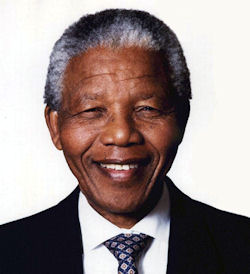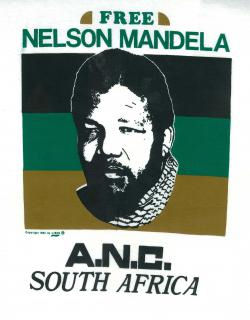Nelson Rolihlahla Mandela
 Nelson Mandela passed away on December 5, 2013 at the age of 95.
Nelson Mandela passed away on December 5, 2013 at the age of 95.
Nelson Mandela was known as "Madiba," which is the name of the clan of which he is a member. A clan name is much more important than a surname as it refers to the ancestor from which a person is descended. Madiba was the name of a Thembu chief who ruled in the Transkei in the 18th century. It is considered very polite to use someone’s clan name.
Nelson Mandela's powerful story of offender to beloved first president of South Africa has made him a symbol of the worldwide struggle against injustice and a continuing source of inspiration to people the world over. Nelson Mandela is ranked first in a perception index of the world's most visible leaders and public personalities in politics, business, culture and sport in the 2011 Leader RepTrak, a new global study of the general public developed by the Reputation Institute.
From a young age, Mr. Mandela was aware of the economic and civil injustices that plagued South Africa under apartheid, where racial discrimination was official government policy. Nelson Rolihlahla Mandela was born to the Thembo Dynasty in Mvezo in the Umtata District of Transkei, South Africa, on July 18, 1918. His family belonged to the Thembo Dynasty, a Xhosa noble bloodline in South Africa. He was well educated, earned a law degree, set up a law practice with his long-time friend who spent 27 years with him on Robben Island, Walter Sisulu.
Nelson Mandela joined the African National Congress in 1942, which was established in 1912 to fight for justice and equality for Africans against discrimination and unjust laws prescribed by the minority European settlers. For decades leaders of the ANC challenged the segregation system imposed on them and demanded, through petition to the courts and to the British Royalty and government, the freedoms and opportunities afforded the whites who dominated South Africa at that time.
In 1944 joined with other young dissidents to form the African National Congress Youth League (ANCYL), which embraced African nationalism and began building a mass movement. After the National Party came to power in an all-white election in 1948 on a platform of apartheid, a system of strict racial segregation, the ANC adopted the Programme of Action, inspired by the ANCYL, which advocated the use of boycotts, strikes, civil disobedience, and noncooperation against the National Party's apartheid policies.
In 1952, after being designated volunteer-in-chief of the Defiance Campaign Against Unjust Laws, Nelson Mandela traveled the country, organizing resistance to discriminatory legislation. In recognition of his outstanding contribution during the Defiance Campaign, Nelson Mandela was elected to the presidency of both the ANCYL and the Transvaal region of the ANC at the end of 1952, earning him a position as deputy president of the ANC itself.
After the banning of the ANC in 1960 and the continued violent response to the ANC's nonviolent methods, Nelson Mandela led the effort to set up Umkhonto we Sizwe (``Spear of the Nation''), the armed resistance organization of the ANC. Iin 1964, Nelson Mandela and 9 of his fellow leaders of the ANC and Umkhonto we Sizwe were arrested, charged with treason, and brought to trial for plotting the violent overthrow the Government of South Africa.
In his statement at the opening of the defense case in the historic Rivonia Treason Trial on April 20, 1964, in which he and 9 other ANC leaders were tried for 221 acts of sabotage designed to ``ferment violent revolution'' to overthrow the apartheid system, Nelson Mandela use his oratory skills as a legal advocate to lay out the reasoning for the ANC's choice to use acts of sabotage as a tactic to defeat apartheid, as doing otherwise would have been tantamount to unconditional surrender.
He closed his statement with these words: ``During my lifetime I have dedicated myself to the struggle of the African people. I have fought against White domination, and I have fought against Black domination. I have cherished the ideal of a democratic and free society in which all persons live together in harmony and with equal opportunities. It is an ideal which I hope to live for and to achieve. But if needs be, it is an ideal for which I am prepared to die.''.
 On June 12, 1964, 8 of the accused, including Nelson Mandela, were sentenced to life imprisonment. From 1964 to 1982, Nelson Mandela was incarcerated at Robben Island Prison, off the coast of Cape Town, and thereafter at Pollsmoor Prison, nearby on the mainland.
On June 12, 1964, 8 of the accused, including Nelson Mandela, were sentenced to life imprisonment. From 1964 to 1982, Nelson Mandela was incarcerated at Robben Island Prison, off the coast of Cape Town, and thereafter at Pollsmoor Prison, nearby on the mainland.
Nelson Mandela consistently refused to compromise his political demands for freedom and equality for all South Africans to obtain his freedom while in prison. Nelson Mandela became widely accepted around the world as one of the most significant leaders of the 20th century and became a potent symbol of resistance as the anti-apartheid movement gathered strength. The Congressional Black Caucus and other Members of Congress actively engaged in efforts to bring about an end to South Africa's apartheid system and played a key role in raising public awareness in the United States about South Africa's racist regime.
After nearly 14 years of opposition, the Comprehensive Anti-Apartheid Act of 1986 was finally agreed to by both Houses of Congress, calling for sanctions against South Africa and establishing conditions for the lifting of such sanctions, including the release of all political prisoners including Nelson Mandela. The Comprehensive Anti-Apartheid Act of 1986 withstood a veto by President Ronald Reagan making it the first time in the 20th century that a President had a foreign policy veto overridden by Congress.
Nelson Mandela was released from prison on February 11, 1990, after the apartheid Government of South Africa agreed to his terms for release. After his release, he plunged himself wholeheartedly into his life's work, striving to attain the goals he and others had set out almost 4 decades earlier. In 1991, at the first national conference of the ANC held inside South Africa after the organization had been banned in 1960, Nelson Mandela was elected President of the ANC. Mr. Mandela's struggle distinguished him as an extraordinary leader in the eyes of the international community and his fellow South Africans. Mr. Mandela was presented with the Nobel Peace Prize in 1993, , which he shared with former South African President F.W. de Klerk, and he accepted the award on behalf of all South Africans who had made tremendous sacrifices in the name of peace and liberty.
Nelson Mandela was elected President of South Africa in that country's first democratic elections with full enfranchisement was granted were held on April 27, 1994, and was inaugurated on May 10, 1994, as the country's first indigenous African President. As President from May 1994 until June 1999, Nelson Mandela presided over the transition from minority rule and apartheid to a participatory democracy, winning international respect for his advocacy of national reconciliation and international peace.
Even after stepping down from the South African presidency, Mr. Mandela's commitment to service did not waiver. Mr. Mandela has since founded three foundations: The Nelson Mandela Centre of Memory, the Nelson Mandela Children's Fund, and the Mandela -Rhodes Foundation. In 2009, July 18 was adopted by the United Nations as Nelson Mandela International Day of Service. Mr. Mandela gave 67 years of his life to the fight for human rights, and people all over the world are asked to spend Mandela Day giving 67 minutes of their time to serve their local communities and charities.
Personal | |
| |
Positions last held in government | |
| |
Academic Qualifications | |
| |
Career/Positions/Memberships/Other Activities | |
| |
|
NEWSLETTER
|
| Join the GlobalSecurity.org mailing list |
|
|
|

